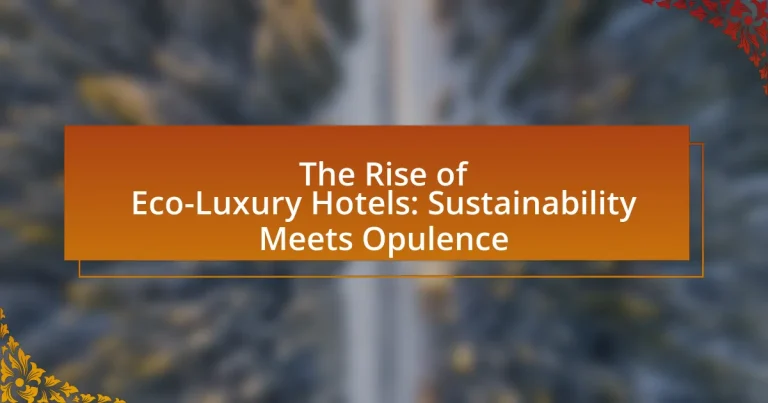Eco-luxury hotels represent a growing segment of the hospitality industry that merges high-end luxury with sustainable practices. These accommodations prioritize environmental responsibility through initiatives such as renewable energy use, waste reduction, and local sourcing of materials. The article explores how eco-luxury hotels differ from traditional luxury hotels, the sustainable practices they implement, and the amenities they offer while maintaining opulence. It also examines the rising consumer demand for eco-friendly travel options, the challenges these hotels face, and the future trends shaping the sector. Key features include the integration of local culture, wellness facilities, and the impact of technology on sustainability efforts.

What are Eco-Luxury Hotels?
Eco-luxury hotels are accommodations that combine high-end luxury with sustainable practices. These hotels prioritize environmental responsibility by implementing eco-friendly initiatives such as using renewable energy sources, minimizing waste, and sourcing local, organic materials. For instance, a report by the Global Sustainable Tourism Council highlights that eco-luxury hotels often engage in conservation efforts and support local communities, ensuring that their operations benefit both the environment and the economy.
How do Eco-Luxury Hotels differ from traditional luxury hotels?
Eco-luxury hotels prioritize sustainability and environmental responsibility, distinguishing them from traditional luxury hotels that often focus solely on opulence and comfort. Eco-luxury hotels implement practices such as using renewable energy sources, sourcing local and organic materials, and minimizing waste, while traditional luxury hotels may not emphasize these eco-friendly initiatives. For instance, a report by the Global Sustainable Tourism Council indicates that eco-luxury hotels can reduce their carbon footprint by up to 30% through sustainable practices, showcasing their commitment to environmental stewardship compared to conventional luxury accommodations.
What sustainable practices are commonly implemented in Eco-Luxury Hotels?
Eco-luxury hotels commonly implement sustainable practices such as energy efficiency, water conservation, and waste reduction. These hotels often utilize renewable energy sources, like solar panels, to minimize their carbon footprint. Additionally, they may incorporate water-saving fixtures and systems, such as low-flow showers and rainwater harvesting, to reduce water consumption. Waste reduction strategies include composting organic waste and recycling materials, which help divert waste from landfills. According to a report by the Global Sustainable Tourism Council, eco-luxury hotels that adopt these practices not only enhance their environmental responsibility but also attract environmentally conscious travelers, demonstrating a growing trend in the hospitality industry.
How do Eco-Luxury Hotels maintain opulence while being sustainable?
Eco-Luxury Hotels maintain opulence while being sustainable by integrating high-end design with environmentally friendly practices. These hotels often utilize sustainable materials, such as reclaimed wood and eco-friendly textiles, to create luxurious interiors that do not compromise on aesthetics. Additionally, they implement energy-efficient technologies, like solar panels and smart climate control systems, which reduce their carbon footprint while providing guests with modern comforts. For instance, a study by the Global Sustainable Tourism Council highlights that eco-luxury accommodations can achieve a 30% reduction in energy consumption through such innovations, demonstrating that sustainability and luxury can coexist effectively.
Why is the concept of Eco-Luxury Hotels gaining popularity?
The concept of Eco-Luxury Hotels is gaining popularity due to the increasing consumer demand for sustainable travel options that do not compromise on comfort and luxury. This trend is driven by a growing awareness of environmental issues, with 73% of travelers indicating a preference for eco-friendly accommodations, according to a 2021 survey by Booking.com. Eco-Luxury Hotels cater to this demand by integrating sustainable practices, such as using renewable energy sources, sourcing local materials, and minimizing waste, while still providing high-end amenities and experiences. This combination of luxury and sustainability appeals to affluent travelers who seek to align their values with their lifestyle choices.
What trends are driving the rise of Eco-Luxury Hotels?
The rise of Eco-Luxury Hotels is driven by increasing consumer demand for sustainable travel options, heightened awareness of environmental issues, and a shift in luxury standards towards eco-consciousness. Consumers are increasingly prioritizing sustainability, with a 2021 survey by Booking.com revealing that 81% of travelers believe that sustainable travel is important. Additionally, luxury hotels are adopting green practices such as energy efficiency, waste reduction, and sourcing local materials to meet the expectations of environmentally conscious guests. This trend is further supported by the growing market for eco-friendly products and services, which is projected to reach $150 billion by 2021, indicating a robust demand for eco-luxury experiences.
How do consumer preferences influence the growth of Eco-Luxury Hotels?
Consumer preferences significantly influence the growth of Eco-Luxury Hotels by driving demand for sustainable and high-end travel experiences. As more travelers prioritize environmental responsibility, hotels that incorporate eco-friendly practices, such as using renewable energy, sourcing local materials, and minimizing waste, attract a growing segment of conscious consumers. According to a 2021 study by Booking.com, 81% of global travelers expressed a desire to stay in eco-friendly accommodations, indicating a clear market trend towards sustainability. This shift in consumer behavior compels hotel operators to adapt their offerings, leading to an increase in the number of Eco-Luxury Hotels that blend luxury with sustainable practices, thereby fostering growth in this niche market.

What are the key features of Eco-Luxury Hotels?
Eco-luxury hotels are characterized by their commitment to sustainability while providing high-end amenities and services. These hotels often incorporate renewable energy sources, such as solar panels and wind turbines, to minimize their carbon footprint. Additionally, they utilize eco-friendly materials in construction and furnishings, ensuring that their design aligns with environmental standards. Water conservation practices, such as low-flow fixtures and rainwater harvesting, are commonly implemented to reduce water usage. Furthermore, eco-luxury hotels frequently source food locally and offer organic dining options, supporting local economies and reducing transportation emissions. The integration of wellness programs, such as spa treatments using natural products, enhances the guest experience while promoting health and sustainability.
How do Eco-Luxury Hotels incorporate local culture and environment?
Eco-luxury hotels incorporate local culture and environment by integrating indigenous design elements, sourcing local materials, and offering culturally immersive experiences. These hotels often feature architecture that reflects regional styles, such as using traditional building techniques and local artisans for decor, which enhances the authenticity of the guest experience. Additionally, they prioritize sustainability by utilizing eco-friendly practices, such as energy-efficient systems and waste reduction initiatives, which align with the environmental values of the local community. For instance, many eco-luxury hotels engage in partnerships with local farmers to provide organic food options, thereby supporting the local economy and reducing carbon footprints associated with food transportation. This approach not only preserves local culture but also fosters a sense of community and responsibility towards the environment.
What role does architecture play in Eco-Luxury Hotels?
Architecture plays a crucial role in Eco-Luxury Hotels by integrating sustainable design principles that enhance both environmental responsibility and guest experience. This includes the use of eco-friendly materials, energy-efficient systems, and designs that harmonize with the natural surroundings, which collectively reduce the ecological footprint of the hotel. For instance, many Eco-Luxury Hotels utilize passive solar design to minimize energy consumption, while green roofs and walls improve insulation and biodiversity. These architectural choices not only promote sustainability but also create aesthetically pleasing environments that attract eco-conscious travelers, thereby supporting the growing trend of luxury accommodations that prioritize sustainability.
How do Eco-Luxury Hotels ensure minimal environmental impact?
Eco-luxury hotels ensure minimal environmental impact by implementing sustainable practices such as using renewable energy sources, conserving water, and sourcing local, organic materials. These hotels often utilize solar panels and wind energy to reduce their carbon footprint, while advanced water-saving technologies help minimize consumption. Additionally, eco-luxury hotels prioritize local sourcing for food and materials, which reduces transportation emissions and supports local economies. According to a study by the Global Sustainable Tourism Council, hotels that adopt these practices can significantly lower their environmental impact, demonstrating a commitment to sustainability while providing luxury experiences.
What amenities can guests expect in Eco-Luxury Hotels?
Guests in Eco-Luxury Hotels can expect a range of sustainable and high-end amenities designed to enhance comfort while minimizing environmental impact. These amenities often include organic bedding made from sustainable materials, energy-efficient lighting, and water-saving fixtures. Additionally, many Eco-Luxury Hotels provide locally sourced gourmet dining options, spa services using natural products, and wellness programs that promote holistic health.
For instance, a study by the Global Sustainable Tourism Council highlights that Eco-Luxury Hotels frequently incorporate renewable energy sources, such as solar panels, to power their facilities, further emphasizing their commitment to sustainability. This combination of luxury and eco-friendliness not only caters to the guests’ comfort but also aligns with their values regarding environmental responsibility.
How do dining options reflect sustainability in Eco-Luxury Hotels?
Dining options in Eco-Luxury Hotels reflect sustainability through the use of locally sourced, organic ingredients and environmentally friendly practices. These hotels prioritize farm-to-table dining, which reduces carbon footprints associated with transportation and supports local economies. For instance, a study by the World Resources Institute indicates that sourcing food locally can cut greenhouse gas emissions by up to 50%. Additionally, many Eco-Luxury Hotels implement waste reduction strategies, such as composting and minimizing single-use plastics, further enhancing their commitment to sustainability. This holistic approach not only provides guests with high-quality dining experiences but also aligns with the growing consumer demand for environmentally responsible practices in the hospitality industry.
What wellness and recreational facilities are typically offered?
Eco-luxury hotels typically offer wellness and recreational facilities such as spas, fitness centers, yoga studios, swimming pools, and nature trails. These facilities are designed to promote relaxation, physical fitness, and connection with nature, aligning with the sustainability ethos of eco-luxury accommodations. For instance, many eco-luxury hotels incorporate organic and locally sourced products in their spa treatments, enhancing the wellness experience while supporting local economies. Additionally, outdoor activities like hiking and biking are often available, allowing guests to engage with the surrounding environment in a sustainable manner.

What challenges do Eco-Luxury Hotels face?
Eco-luxury hotels face significant challenges, primarily related to balancing sustainability with high operational costs. These establishments often struggle with the expense of sourcing eco-friendly materials and technologies, which can lead to higher prices for consumers. Additionally, maintaining luxury standards while implementing sustainable practices can create conflicts, as some eco-friendly options may not meet the expectations of luxury clientele. Furthermore, eco-luxury hotels must navigate the complexities of marketing their sustainability efforts effectively, as consumers may be skeptical about greenwashing. According to a report by the Global Sustainable Tourism Council, 70% of travelers are willing to pay more for sustainable options, yet only a fraction of eco-luxury hotels successfully communicate their genuine commitment to sustainability.
How do Eco-Luxury Hotels balance cost and sustainability?
Eco-luxury hotels balance cost and sustainability by implementing energy-efficient technologies and sourcing local, organic materials, which reduce operational costs while minimizing environmental impact. For instance, many eco-luxury hotels invest in solar panels and energy-efficient appliances, leading to lower utility bills and a reduced carbon footprint. Additionally, sourcing food and materials locally not only supports the local economy but also decreases transportation costs and emissions. According to a study by the Global Sustainable Tourism Council, hotels that adopt sustainable practices can see a return on investment of up to 20% through energy savings and increased customer loyalty.
What are the financial implications of adopting sustainable practices?
Adopting sustainable practices can lead to significant financial benefits for businesses, particularly in the hospitality sector. These benefits include cost savings through energy efficiency, reduced waste management expenses, and potential tax incentives for environmentally friendly initiatives. For instance, a study by the Harvard Business Review found that companies implementing sustainability measures can reduce operating costs by 20% or more. Additionally, eco-luxury hotels often attract a growing demographic of environmentally conscious consumers willing to pay a premium for sustainable options, which can enhance revenue. Furthermore, sustainable practices can improve brand reputation and customer loyalty, leading to increased market share and long-term profitability.
How do Eco-Luxury Hotels address guest expectations for luxury?
Eco-Luxury Hotels address guest expectations for luxury by integrating high-end amenities with sustainable practices. These hotels offer premium accommodations, gourmet dining, and personalized services while prioritizing eco-friendly materials and energy-efficient technologies. For instance, many eco-luxury hotels utilize locally sourced organic products, reducing their carbon footprint and enhancing the guest experience with authentic regional flavors. Additionally, they often feature spa services that use natural ingredients, further aligning luxury with sustainability. This dual focus not only meets the desires of environmentally conscious travelers but also elevates the overall luxury experience, as evidenced by the growing demand for such accommodations, which has increased by 20% in recent years according to industry reports.
What regulatory and certification challenges exist for Eco-Luxury Hotels?
Eco-luxury hotels face significant regulatory and certification challenges primarily due to the complexity of sustainability standards and varying regulations across regions. These hotels must navigate a patchwork of local, national, and international regulations that govern environmental practices, which can differ widely, complicating compliance efforts. For instance, certifications such as LEED (Leadership in Energy and Environmental Design) or Green Key require adherence to specific criteria that may not align with local laws, creating potential conflicts. Additionally, the evolving nature of sustainability regulations means that eco-luxury hotels must continuously adapt to new requirements, which can strain resources and increase operational costs. This dynamic landscape necessitates ongoing education and investment in sustainable practices to maintain compliance and achieve certification, ultimately impacting the hotel’s market positioning and profitability.
How do certifications impact the credibility of Eco-Luxury Hotels?
Certifications significantly enhance the credibility of Eco-Luxury Hotels by providing third-party validation of their sustainability practices. These certifications, such as LEED (Leadership in Energy and Environmental Design) and Green Key, establish a recognized standard that assures guests of the hotel’s commitment to environmental responsibility. For instance, a study by the Cornell University School of Hotel Administration found that hotels with recognized sustainability certifications experience higher guest satisfaction and loyalty, as consumers increasingly prefer eco-friendly options. This validation not only builds trust with potential guests but also differentiates Eco-Luxury Hotels in a competitive market, reinforcing their reputation as leaders in sustainable luxury hospitality.
What are the common regulations that Eco-Luxury Hotels must comply with?
Eco-luxury hotels must comply with various regulations focused on environmental sustainability, health and safety, and labor practices. These regulations often include adherence to local and international environmental laws, such as the Clean Air Act and Clean Water Act, which mandate pollution control and waste management practices. Additionally, eco-luxury hotels are typically required to meet health and safety standards set by organizations like the Occupational Safety and Health Administration (OSHA) to ensure the well-being of both guests and employees. Labor regulations, including fair wage laws and anti-discrimination policies, are also critical for compliance. These regulations are enforced to promote sustainable practices and ensure the ethical operation of hospitality businesses.
What are the future trends for Eco-Luxury Hotels?
Future trends for eco-luxury hotels include increased integration of sustainable technologies, personalized guest experiences, and a focus on local culture and biodiversity. The adoption of renewable energy sources, such as solar and wind, is expected to rise, with a report from the Global Sustainable Tourism Council indicating that 70% of travelers prefer eco-friendly accommodations. Additionally, eco-luxury hotels are likely to enhance their offerings by incorporating wellness programs and organic, locally sourced food options, aligning with the growing consumer demand for health-conscious travel experiences. Furthermore, the emphasis on reducing carbon footprints and waste management practices will become more pronounced, as evidenced by the commitment of major hotel chains to achieve net-zero emissions by 2050.
How will technology influence the development of Eco-Luxury Hotels?
Technology will significantly influence the development of Eco-Luxury Hotels by enabling sustainable practices and enhancing guest experiences. Innovations such as energy-efficient systems, smart building technologies, and renewable energy sources will reduce the environmental footprint of these hotels. For instance, the integration of IoT devices can optimize energy consumption, while advanced water recycling systems can minimize waste. According to a report by the World Economic Forum, the adoption of smart technologies in hospitality can lead to a 20-30% reduction in energy use, directly supporting the sustainability goals of Eco-Luxury Hotels.
What innovations are emerging in the Eco-Luxury hotel sector?
Innovations in the Eco-Luxury hotel sector include the integration of renewable energy sources, such as solar panels and wind turbines, to power hotel operations sustainably. Many eco-luxury hotels are adopting advanced water conservation technologies, including greywater recycling systems and low-flow fixtures, to minimize water usage. Additionally, the use of sustainable materials in construction and interior design, such as reclaimed wood and recycled metals, is becoming prevalent. Smart technology is also being implemented to enhance energy efficiency, allowing guests to control lighting and climate settings through mobile apps. These innovations are supported by a growing consumer demand for sustainable travel options, with a report from Booking.com indicating that 72% of travelers are more likely to choose eco-friendly accommodations.
What practical tips can travelers consider when choosing Eco-Luxury Hotels?
Travelers should prioritize Eco-Luxury Hotels that have verified sustainability certifications, such as LEED or Green Key, to ensure genuine eco-friendly practices. These certifications indicate adherence to environmental standards, including energy efficiency, water conservation, and waste reduction. Additionally, travelers should research the hotel’s sourcing of local and organic food, as this supports local economies and reduces carbon footprints. Another practical tip is to check for the use of renewable energy sources, such as solar or wind power, which further enhances the hotel’s commitment to sustainability. Lastly, reading guest reviews can provide insights into the hotel’s actual practices and guest experiences related to eco-luxury offerings.
How can travelers identify truly sustainable practices in hotels?
Travelers can identify truly sustainable practices in hotels by looking for certifications from recognized organizations such as Green Key, LEED, or EarthCheck. These certifications indicate that the hotel adheres to specific environmental standards, including energy efficiency, waste reduction, and water conservation. Additionally, travelers should assess the hotel’s commitment to local sourcing of food and materials, as well as its initiatives for community engagement and support. For example, hotels that participate in local conservation projects or employ local staff demonstrate a commitment to sustainability beyond mere compliance.
What questions should travelers ask when booking an Eco-Luxury Hotel?
Travelers should ask about the hotel’s sustainability practices, such as what eco-friendly certifications it holds and how it minimizes its environmental impact. Inquire about the sourcing of materials, including whether the hotel uses local and organic products in its operations. Additionally, ask about energy and water conservation measures, such as the use of renewable energy sources and water-saving technologies. Understanding the hotel’s community engagement initiatives, including support for local businesses and conservation efforts, is also crucial. Finally, travelers should confirm the availability of eco-friendly amenities, such as biodegradable toiletries and recycling programs, to ensure a truly eco-luxury experience.


